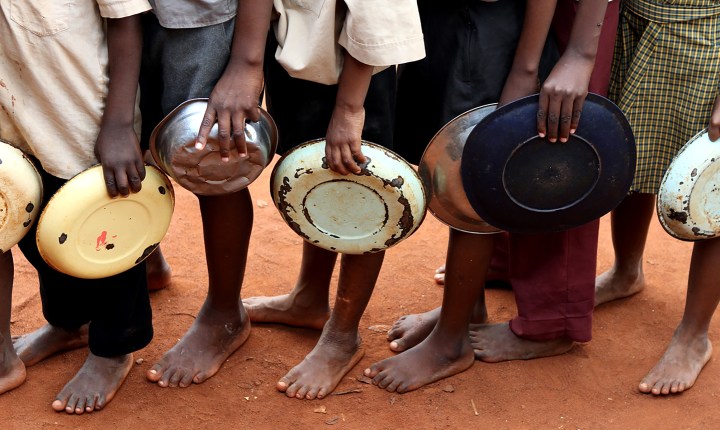HUNGER OP-ED
Government must take action against double burden of malnutrition

This Freedom month, we commemorate 30 years of democracy as well as 25 years of the South African Constitution, a document which was supposed to usher in a generation of South Africans living in dignity, equality and freedom.
There is a dangerous dualism in South Africa: while eight million children go hungry every day and a quarter of all children are stunted (a condition where children are so consistently malnourished their bodies grow less), we also see that one in eight children are overweight (double the global average), and according to current statistics, will grow into a cohort of adults where every second person is obese (obesity is having a higher excess of body fat than from being overweight).
Being overweight or obese is a well-known driver of non-communicable diseases such as cancer, heart disease, diabetes and high blood pressure. More than half of South African deaths are from non-communicable diseases each year, a result of a worrying 60% increase in these diseases in only 20 years, according to StatsSA, which has termed it a “looming health crisis”.
Under- and overweight: Unlikely sides of the same coin
At first glance, the idea of a society where half the population is overweight while severe hunger persists seems dystopian, akin to The Hunger Games, (aptly named) where the rich gorge themselves and the poor fight to survive. But the reality is that in individual households, both co-exist.
Low-income households are more likely to purchase energy-dense, nutritionally poor food which contributes to weight gain. In addition, children who are stunted are more likely to grow up to be overweight or obese adults due to changes in how their bodies process food. Strong evidence has emerged that food companies that sell low-nutrition products target poorer families through marketing and retail outlet placement. The existence of both these phenomena, and their interrelationship, is called the “double burden of malnutrition”.
Does the Constitution have nothing to say about this?
After the ravages of World War 2, the first modern international instrument setting out human rights was created – the Universal Declaration of Human Rights. In the declaration, another core right was entrenched: that everyone has the right to food. For the purpose of discussing the double burden of malnutrition, this has two meanings: there should be enough food (or calories) so that people are not hungry, and the food should be nutritious so that people can be healthy.

A feeding scheme in Cape Town. (Photo: Gallo Images / Brenton Geach)
Governments have a duty to respect, protect and fulfil this right, which means they must ensure that people have enough healthy food, stop other parties (such as companies) from interfering with people accessing such food, and must not be the source of any obstacles to people to have access such food. In 1996, our new Constitution brought this protection home by enshrining the right to food in three different sections, most importantly in section 27 where it provides that everyone should have access to sufficient food and water.
But we cannot eat our Constitution, nor can we simply go to the closest government building and ask for a meal. Rights like these, termed socioeconomic rights, are rights to food, healthcare and water, and exist in the form of a duty on the government of South Africa to, within available resources, create laws and policies which give access to these rights.
It is within this context that the South African government must provide school meals, social grants and food parcels in emergencies and regulate how to guarantee that the food we eat is safe. This is done through a combination of laws and policies.
You can’t eat the Constitution, but you can force the government to action it
We need two streams of government action to stop South Africa from suffocating under the double burden of malnutrition.
First, we need to end food poverty. There are a range of measures important to achieving this, but an immediate step is for the government to extend the Social Relief of Distress Grant introduced during Covid-19 to function as a permanent social safety mechanism and raise it to at least R624 (the food poverty lower limit).
Providing food subsidies for local, healthy produce, extending the school nutrition programme to include more and better meals and topping up other existing grants are also the most effective interventions.
Second, we need policies to help South Africans eat less unhealthy food. Interventions like the proposed Front-of-Pack Warning Label, which will give consumers information if the food they are eating contains too many “bad” ingredients, are cost-effective and empowering ways to change eating habits.
Taxes on products such as sodas are a double win – more public funds and less sugar in our already diabetic-prone society. In South Africa, this is called the Health Promotion Levy and evidence suggests that since its inception in 2018, it has already changed buying patterns and sugar levels in cool drinks.
We can only get these policies if we demand government action. The first words in our Constitution are: “We, the people of South Africa”. Take these words to heart and demand that the South African government takes steps to end hunger and poor nutrition. DM
Petronell Kruger is the Interim Programme Manager at Healthy Living Alliance ( Heala).



















Comments - Please login in order to comment.